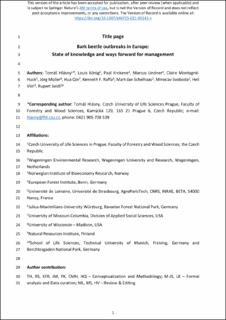| dc.contributor.author | Hlásny, Tomáš | |
| dc.contributor.author | König, Louis | |
| dc.contributor.author | Krokene, Paal | |
| dc.contributor.author | Lindner, Marcus | |
| dc.contributor.author | Montagné-Huck, Claire | |
| dc.contributor.author | Müller, Jörg | |
| dc.contributor.author | Qin, Hua | |
| dc.contributor.author | Raffa, Kenneth F. | |
| dc.contributor.author | Schelhaas, Mart-Jan | |
| dc.contributor.author | Svoboda, Miroslav | |
| dc.contributor.author | Viiri, Heli | |
| dc.contributor.author | Seidl, Rupert | |
| dc.date.accessioned | 2022-02-18T14:44:38Z | |
| dc.date.available | 2022-02-18T14:44:38Z | |
| dc.date.created | 2021-10-04T11:09:09Z | |
| dc.date.issued | 2021-07-28 | |
| dc.identifier.citation | Current Forestry Reports. 2021, 7 138-165. | en_US |
| dc.identifier.issn | 2198-6436 | |
| dc.identifier.uri | https://hdl.handle.net/11250/2980108 | |
| dc.description.abstract | Purpose of Review Outbreaks of tree-killing bark beetles have reached unprecedented levels in conifer forests in the northern hemisphere and are expected to further intensify due to climate change. In parts of Europe, bark beetle outbreaks and efforts to manage them have even triggered social unrests and political instability. These events have increasingly challenged traditional responses to outbreaks, and highlight the need for a more comprehensive management framework. Recent Findings Several synthesis papers on different aspects of bark beetle ecology and management exist. However, our understanding of outbreak drivers and impacts, principles of ecosystem management, governance, and the role of climate change in the dynamics of ecological and social systems has rapidly advanced in recent years. These advances are suggesting a reconsideration of previous management strategies. Summary We synthesize the state of knowledge on drivers and impacts of bark beetle outbreaks in Europe and propose a comprehensive context-dependent framework for their management. We illustrate our ideas for two contrasting societal objectives that represent the end-members of a continuum of forest management goals: wood and biomass production and the conservation of biodiversity and natural processes. For production forests, we propose a management approach addressing economic, social, ecological, infrastructural, and legislative aspects of bark beetle disturbances. In conservation forests, where non-intervention is the default option, we elaborate under which circumstances an active intervention is necessary, and whether such an intervention is in conflict with the objective to conserve biodiversity. Our approach revises the current management response to bark beetles in Europe and promotes an interdisciplinary social-ecological approach to dealing with disturbances. | en_US |
| dc.language.iso | eng | en_US |
| dc.publisher | Springer Nature | en_US |
| dc.title | Bark beetle outbreaks in Europe: state of knowledge and ways forward for management | en_US |
| dc.type | Peer reviewed | en_US |
| dc.type | Journal article | en_US |
| dc.description.version | acceptedVersion | en_US |
| dc.rights.holder | © The Author(s), under exclusive licence to Springer Nature Switzerland AG 2021 | en_US |
| dc.source.pagenumber | 138-165 | en_US |
| dc.source.volume | 7 | en_US |
| dc.source.journal | Current Forestry Reports | en_US |
| dc.identifier.doi | 10.1007/s40725-021-00142-x | |
| dc.identifier.cristin | 1942959 | |
| dc.relation.project | National Science Foundation: 1733990 | en_US |
| dc.relation.project | Norges forskningsråd: 249958 | en_US |
| cristin.ispublished | true | |
| cristin.fulltext | postprint | |
| cristin.qualitycode | 1 | |
